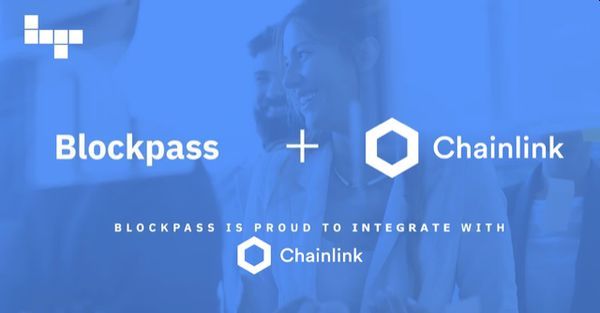Blockpass has revealed its mainnet launch as a data provider on the Chainlink Network – a decentralized oracle solution in the blockchain ecosystem. This integration will result in Blockpass, via our their Chainlink node managed by LinkPool, providing seamless and secure on-chain KYC data across all of the leading blockchain platforms. The possibilities created by this include multiple services for proving age, geography, and investor classification.
Much like the oracles in ancient times, entities on the blockchain turn to oracles as a source of information that comes from outside their frame of reference – knowledge they could not get themselves. At Delphi, visitors would speak to the Pythia and receive the wisdom of the god Apollo for answers to deep or important questions; on a blockchain, entities such as smart contracts can obtain external information or data from an oracle in order to execute critical on-chain functions.
For example, a blockchain-based gaming app could use an oracle to establish the score of a football match before settling a bet, or an on-chain rental agreement may rely on an oracle to notify it when the appropriate payment is made into an off-chain account before unlocking the rental property. Oracles are therefore necessary to enable blockchains to connect and exchange data with the real world. Chainlink has established itself as the market-leader in blockchain oracles by providing a multitude of guarantees to users, including thoroughly audited and time-tested open source oracle software, the ability to cryptographically sign data on-chain to prove its integrity as coming from the intended source, reputation systems and listing services so users can verify the performance of oracle nodes, and a blockchain agnostic design that can make data available to all current and future blockchains from a single framework.
Whilst blockchain technology holds vast potential to revolutionize multiple industries, with solutions that generate huge time and efficiency savings for existing business processes or even seed entirely new business models, it has also suffered in the past from a lack of regulation and compliance. Without the security provided by regulatory oversight and the ability to prove compliance, the blockchain industry is still plagued by a lack of trust, which has restricted its adoption by traditional financial entities and left users open to scams and malicious actors. Without a means to identify entities involved in a blockchain application, many meaningful use cases cannot operate in a trusted manner consistent with current regulations.
These realizations, and the necessity of identification services, led to the development of Blockpass, a digital identity verification provider offering a one-click compliance gateway to financial services and other regulated industries. Through Blockpass, users can create, store, and manage a data-secure digital identity that can be used for an entire ecosystem of services, token purchases, and regulated industry access. For businesses and merchants, Blockpass is a comprehensive KYC and AML SaaS that requires no integration or setup cost. You can set up a service in minutes, test the service for free, and start verifying and on-boarding users.
By combining the two technologies, Blockpass and Chainlink can provide a solution that the blockchain ecosystem desperately needs – automated on-chain KYC in a blockchain-agnostic manner. When Blockpass was first created, the driving force behind its development was providing identities for every component or person on the blockchain in order to facilitate interactions via on-chain identities. Despite this, putting personal information onto an immutable blockchain generates personal and regulatory conflicts, particularly where data privacy is concerned.
Through Chainlink’s innovative oracle solution, dApps can use the BlockPass Chainlink oracle to perform KYC and identity verification checks on a variety of blockchains in a simple, safe, and compliant manner, all without ever putting personal data on-chain. Blockpass will also cryptographically sign the data it posts on-chain through the unique private key of our Chainlink node, giving users even greater assurances that it came direct from the source and was not tampered with. This allows the Chainlink Network to support an evolution in regulatory compliant DeFi applications via Blockpass’ unique KYC Connect solution and verification services.
“The opportunity of working with Chainlink was really a no-brainer for us,” Blockpass CEO Adam Vaziri said. “We share distinctly similar values around the importance of security, the demand for on-chain compliance, and the power of decentralization. This integration will enable us to do what we’ve always been working towards, provide KYC and virtual asset/blockchain compliance data on-chain across multiple blockchains. We first introduced the world to the idea of anon-chain KYC provider, which was why we built Blockpass in the first place – and now with the help of Chainlink it’s finally in production.”
“We’re excited to empower developers around the world wanting to build regulatory compliant DeFi applications by providing them with on-chain access to Blockpass’s KYC/AML services via Chainlink,” Chainlink head of business development Daniel Kochis said. “This expansion in data available to smart contract developers will support a next wave of more advanced DeFi products, particularly those seeking to build or access on-chain financial products with built-in compliance.”
Blockpass has grown significantly in size and use since its inception, both in the number and range of users and companies it has partnered with, and the scope of its work. Blockpass continues to develop its digital identity protocol with updates and additions to improve the compliance experience. Blockpass has seen rapidly increasing numbers of users in the past year as its identity verification solution is used for ICOs, STOs and IEOs, including supporting a number of successful fundraisers in the past few months.
The Blockpass App is available from the App Store and Google Play.












